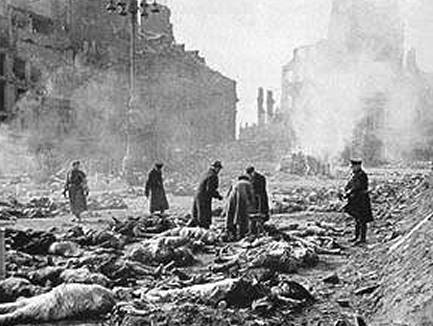A survivor remembers the bombing of Dresden by Jay Knott (02/15/13) ⇌ (War crimes)

It's generous of the Guardian to allow the argument that it was a war crime:
http://www.guardian.co.uk/commentisfree/2013/feb/15/bombing-dresden-war-crime
It has also published the view that the casualties at Dresden were exaggerated by David Irving:
http://www.guardian.co.uk/world/2010/mar/21/dresden-war-crimes-death-toll
This is Peter Beaumont on Dresden:
Now, in what seems likely to be the last word on the matter, a German historical commission set up to examine the precise numbers of those who died has reported. After five years' work it has established that the toll was around 25,000… Why this matters so long after the event is not simply because it undermines those on the far right who seek to establish a moral equality between the crimes of Nazi Germany and "Allied crimes", but also because of Hilberg's wider point over the "sanctity of facts". Because the numbers really do matter.... Holocaust deniers like to play with the numbers."
Beaumont gives us the official party line: the bombing of Dresden killed less than a fifth of Irving's estimate. This "seems likely" to be the "last word". As for Nazi crimes, the official estimates have "sanctity". Raul Hilberg, holocaust historian, said so. He doesn't "play with the numbers", like "holocaust deniers" "like to" do. "Like to"? They do it for fun?
He also uses the term "holocaust denier" to describe those he disagrees with about more recent massacres in Bosnia, as well as in the Third Reich. In the former case, his bias is anti-Serbian, rather than anti-German. During world war II, the Allies collaborated with Serbian war criminals.
Beaumont's version of history closely follows the twists and turns of American policy. For him, as for most of the media, facts are not sacrosanct, they are subservient to interests.